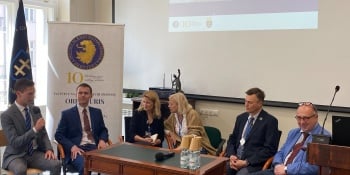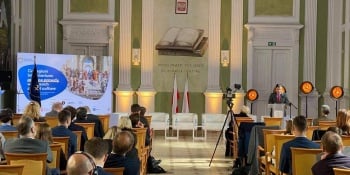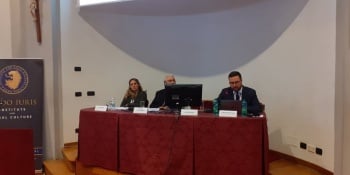
There are many myths about the legal protection of life in the public space. One of them is the claim that Poland, in comparison to most countries of the world, protects the life of unborn children very well. This was the topic of a press conference of the Ordo Iuris Institute.
INTERNATIONAL CLASSIFICATION OF LIFE PROTECTION - DOWNLOAD
During the conference the International Classification of Life Protection was presented. Poland is ranked 127th in it. Only 69 countries have laws that are less protective of life in this respect than our country. In 59 countries, the law ensures full protection of human life.
The event was attended by Ordo Iuris experts and representatives of organizations dealing with life protection - Kaja Godek and Beata Domańska from the Foundation for Life and Family and Paweł Kwaśniak from the Centre for Life and Family.
The President of the Institute, attorney Jerzy Kwaśniewski was the first to take the floor.
‘Whenever we start to discuss the subject of defending life, a false message based on emotions appears in response to it. Hence the postulate of a peaceful look at the myths that function in the public space’, he said.
The International Classification of Life Protection was presented by Tymoteusz Zych, PhD. He referred to myths that few countries in the world protect human lives.
‘The whole strategy of the pro-abortion movement is about distribution of untrue information, which is unreflectively repeated by politicians and the media. We want to debunk a few widespread myths’, he said.
‘2/3 of the world's countries protect human lives more than our country. Poland ranks 127th - out of 196 countries - in the list of world legislation according to the criterion of protection of life. It is worth remembering it’, added Zych, PhD.
Anna Świerzewska, the Institute's analyst, referred to the so-called pendulum effect This is a phenomenon which is supposed to be present in countries where laws protecting life have been introduced.
‘The myth of the “pendulum effect” often resurfaces in discussions. It is the key argument for maintaining the so-called abortion compromise. It turns out that in countries where the level of protection of life has been increased in the last few decades, this effect has not materialised. The "pendulum effect" serves as a myth for politicians who want to come out of discussion when they cannot defend their views and as a threat against the introduction of full legal protection of life into the legal order’, noted the representative of the Ordo Iuris Legislative Analyses Centre.
The conference also focused on social initiatives related to the protection of life taking place in Poland. One of them - Marches for Life and Family - was described in detail by Paweł Kwaśniak, President of the Centre for Life and Family.
‘Marches for Life and Family have been held for 13 years. Every year about 400 thousand people take part in them. The last ones took place in 170 cities. There are other initiatives of this kind’, he said.
‘The fact that you can kill a child with Down syndrome denies the right to life to those who were born. I am disappointed with the attitude of politicians who are afraid to pass a law’, said Beata Domańska from the Life and Family Foundation, a mother of seven children, including one suffering from Down syndrome. She thus referred to the situation of families where children with disabilities are raised.
Kaja Godek, President of the Life and Family Foundation, also took the floor. She thanked the Ordo Iuris Institute for its activities related to the protection of life. She presented the situation around the draft law to protect life entitled "Stop abortion".
‘Nearly one million citizens signed the life protection proposal within three months. The feminist project has been "surpassed" four times. The feminists lied that they had gathered 400,000 signatures. Sejm data show that it was at most 200 thousand’, she added.
Kaja Godek also spoke about the tragic effects of maintaining the so-called abortion compromise.
‘The result of blocking the draft law is the death of three children a day. This is the bloody harvest of these omissions. Since submitting this draft law, 877 children have been brutally killed,’ she said.

A scientific conference "The Phenomenon of Euthanasia. Interdisciplinary Reflections", co-organized by the Ordo Iuris Institute. During the event, the topic was analyzed from the perspective of medicine, law, sociology, philosophy or theology. Speakers presented, among other things, the legal status related to euthanasia in Poland and other European countries. They pointed out the problems raised by the spread of this procedure. Participants also drew attention to the most important measures to counteract the restriction of the right to life.

Collegium Intermarium has started its academic year. The inauguration ceremony took the form of an international conference attended by scholars, politicians and commentators from the US, France, Hungary, Croatia and Poland, among other countries. The guests included French politician Marion Maréchal, New York Post columnist Sohrab Ahmari, Prof. Adrian Vermuele from Harvard University, and former Speaker of the Sejm Dr Józef Zych. The conference is titled “Collegium Intermarium: a space for truth in the era of cancel culture”.

Representatives of state authorities, outstanding academics and journalists from Poland and abroad take part in the conference inaugurating the establishment of Collegium Intermarium. The goal of the new university is to create a platform of co-operation between academics from the Intermarium region. Its flagship field of specialisation is law, but it also offers a rich programme of postgraduate study courses.

An impediment to the realization of real women's rights is the frequent presentation of the concept in ideological ways. One of the most promoted directions in contemporary discourse to realize women's rights is the gender perspective. However, as it turns out, this concept raises a number of doubts, which stem from its strongly ideological nature and lack of effectiveness in real improvement of the situation of women in the world. The second in the series of conferences "In Defense of Women's Rights" was devoted to these issues.

There is currently a wide-ranging discussion on the concept of women's rights. The Ordo Iuris Institute organized the first in a series of debates on this issue. Two panels were devoted to presenting the political and doctrinal context of the issue of women's rights and women's right to health. The main premise of the conference was to address the issue of women's rights in an ideology-free manner.

The values which form the basis for law have a profound impact on modern Europe. This was the topic of the House on the Rock “Axiology of Law for the Europe of Tomorrow” Conference, which saw many prominent researchers engage in discussion in Rome. The event was organised by the Ordo Iuris Institute and the Pontifical University of St. Thomas Aquinas.